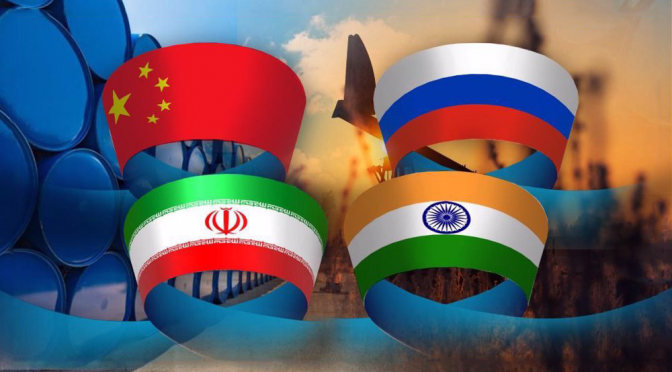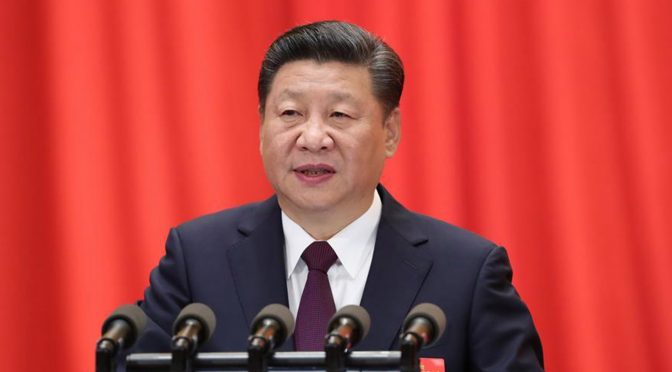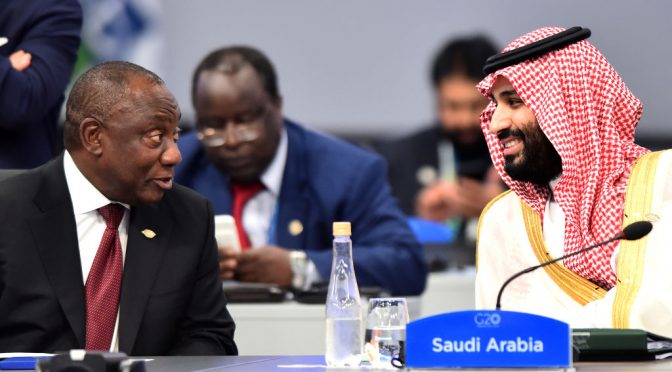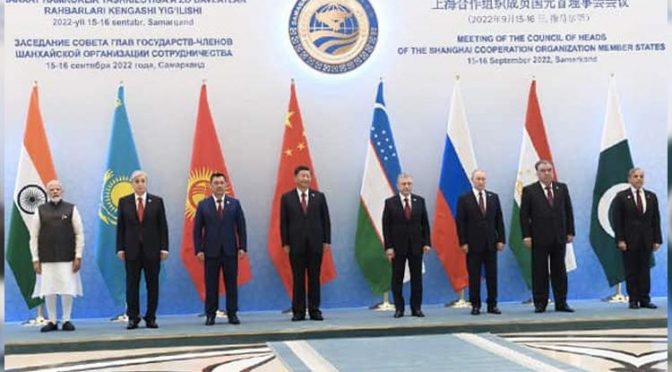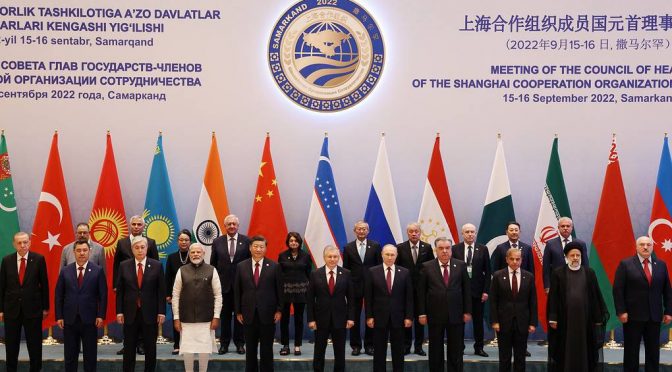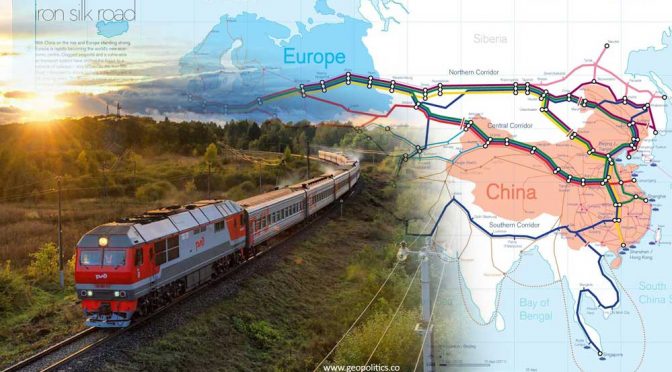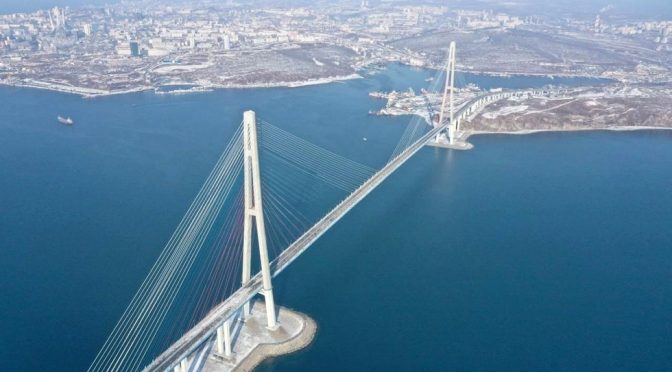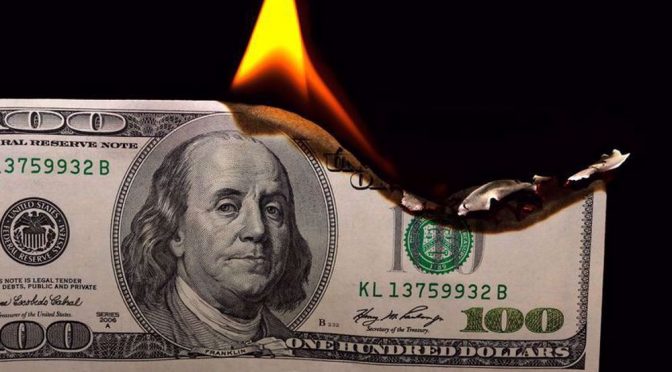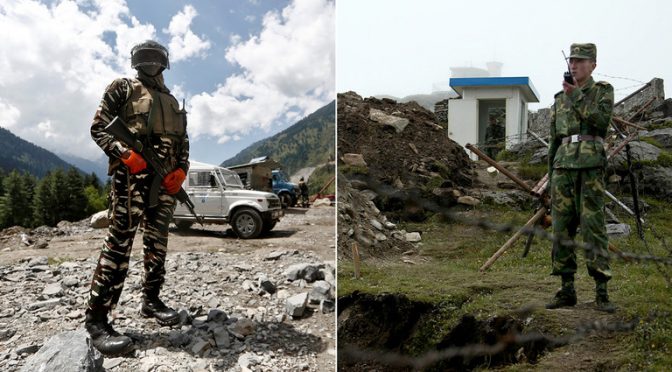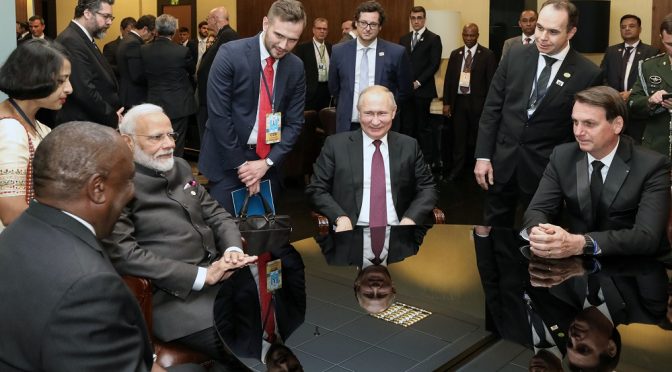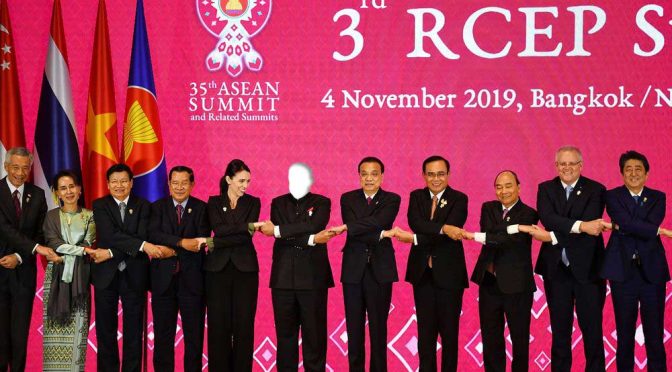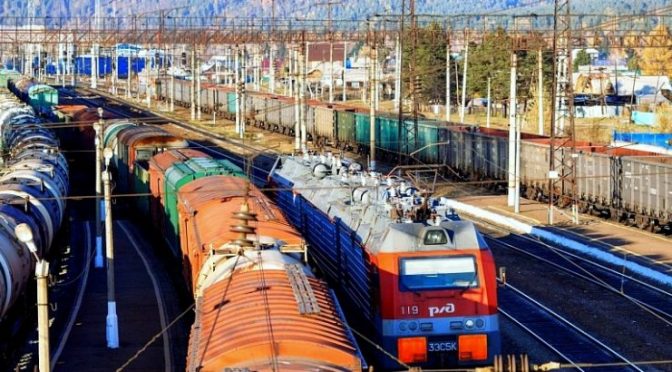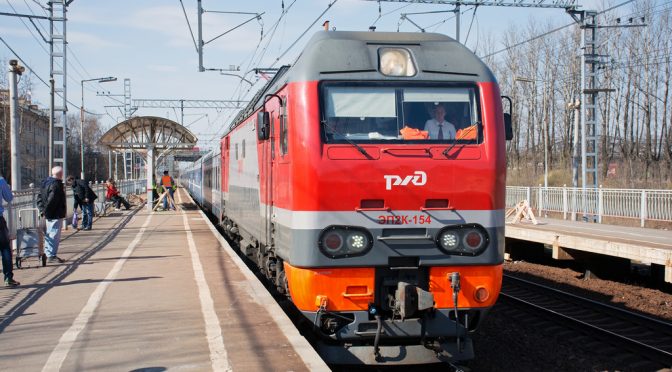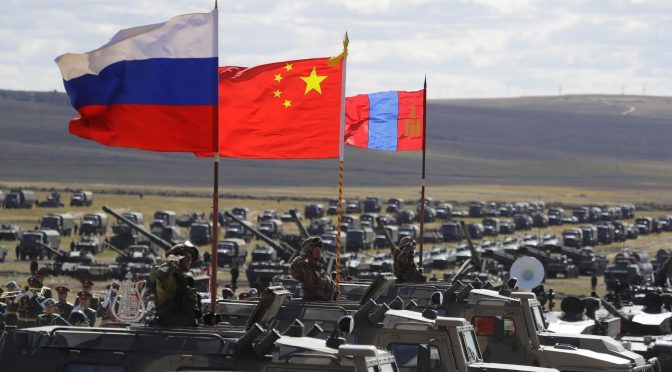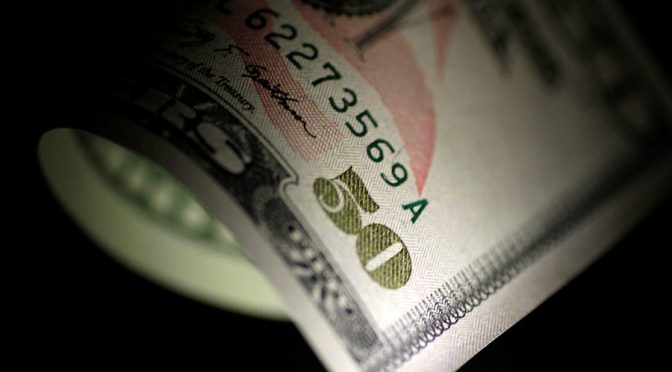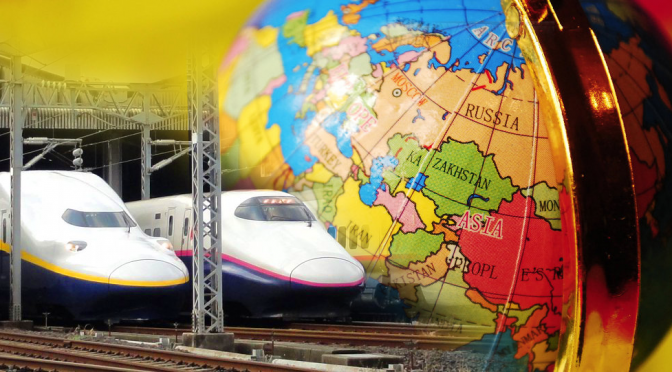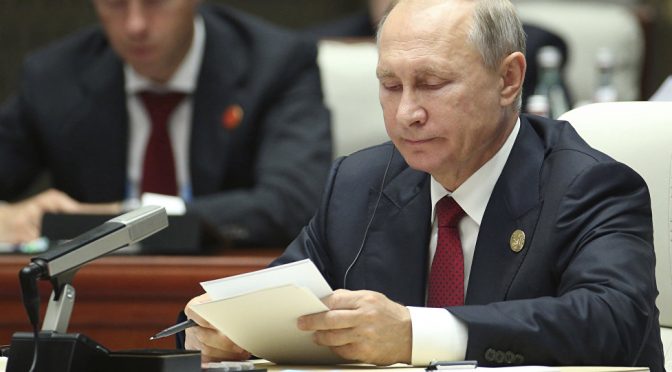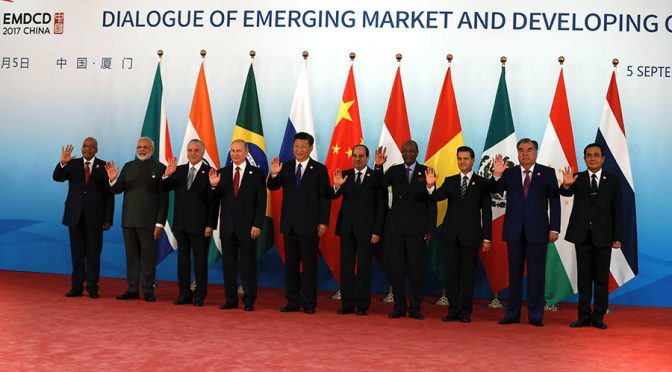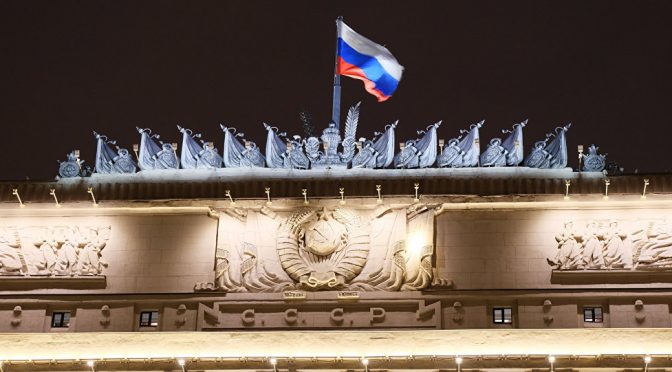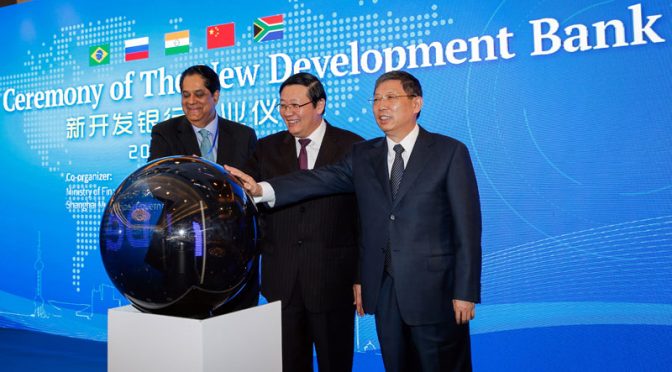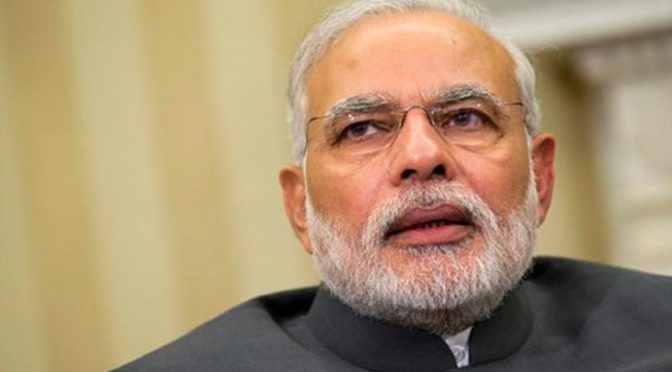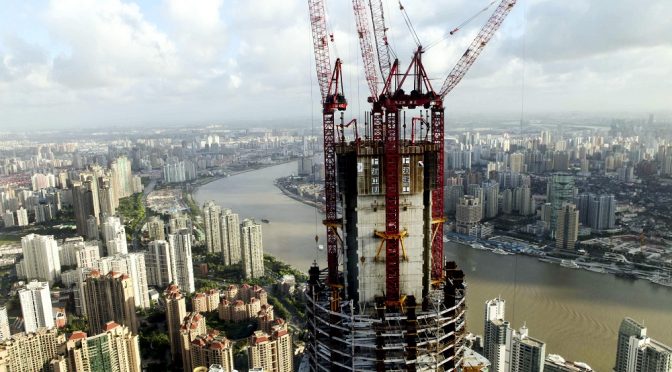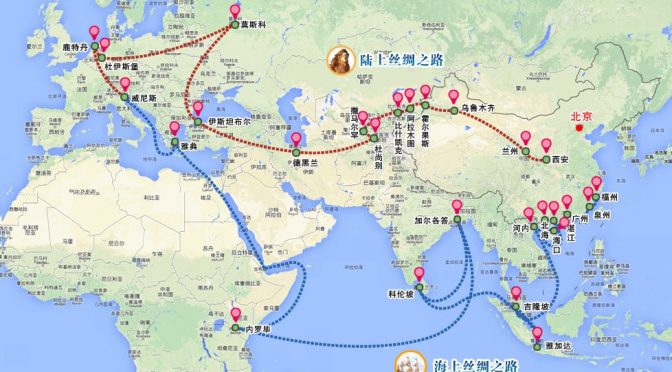The BRICS group, comprising Brazil, Russia, India, China, and South Africa, has been making significant strides in reshaping global governance and economic cooperation. Recent developments, including the expansion of the bloc and calls for reform in international institutions, highlight the growing influence of this coalition of emerging economies.
Continue reading BRICS Parliament & Expansion: Shaping a New Global OrderCategory Archives: BRICS / SCO / EAEU
Putin is Back: This is What His Foreign Policy for the Next Six Years
When he first took office, the Russian president was trying to integrate with the West, now the whole ball game has changed.
Continue reading Putin is Back: This is What His Foreign Policy for the Next Six YearsRaisi led the charge for Russia–Iran–China’s ‘new world order’
Iranian President Ebrahim Raisi’s eastward vision was instrumental in advancing the strategic Moscow–Tehran–Beijing nexus and bulldozing a path toward institutionalizing multipolarity.
Continue reading Raisi led the charge for Russia–Iran–China’s ‘new world order’BRICS ‘Core’ of Global Efforts to Build ‘Just’ World
The Iranian deputy foreign minister says the BRICS group of emerging economies is resolved to build a justice-based world and serve the interests of independent countries.
Continue reading BRICS ‘Core’ of Global Efforts to Build ‘Just’ WorldDe-Dollarization Bombshell: The Coming of BRICS+ Decentralized Monetary Ecosystem
Get ready for what may well be the geoeconomic bombshell of 2024: the coming of a decentralized monetary ecosystem.
Continue reading De-Dollarization Bombshell: The Coming of BRICS+ Decentralized Monetary EcosystemFive Global Supertrends That Will Transform the World
The old world is giving way to a new order. What key political-economic drivers of change are destined to shape our lives in the medium term?
Continue reading Five Global Supertrends That Will Transform the WorldA Convergence of Goals: BRICS and The Resistance Axis
The Gaza war has accelerated cooperation between Global South behemoths resisting western-backed conflict. Together, the Russian-led BRICS and Iran-led Axis of Resistance can shape a US-free West Asia.
Continue reading A Convergence of Goals: BRICS and The Resistance AxisThe Eviction Notice is Being Written, and Will Come in Four Languages
The Eviction Notice is being written. And it will come in four languages. Russian. Farsi. Mandarin. And last but not least, English.
Continue reading The Eviction Notice is Being Written, and Will Come in Four LanguagesBRICS Condemns Israel War Crimes in Gaza
Leaders of emerging economies demanded on Tuesday that Israel stop its war on Gaza and that hostilities cease on both sides in order to alleviate the rapidly worsening humanitarian situation in the Gaza Strip.
The BRICS group condemned attacks on civilians in Israel and Palestine during a virtual summit that was presided over by South African President Cyril Ramaphosa. Several of the leaders referred to the forcible relocation of Palestinians, either inside or outside of Gaza, as “war crimes.”
According to a summary delivered by the chair,
“We condemned any kind of individual or mass forcible transfer and deportation of Palestinians from their own land.
… the forced transfer and deportation of Palestinians, whether inside Gaza or to neighbouring countries, constitute grave breaches of the Geneva conventions and war crimes and violations under International Humanitarian Law.”
The big rising economies of Brazil, Russia, India, China, and South Africa, collectively known as the BRICS, are striving for more influence in the international system that has long been dominated by the United States and its Western allies.
These nations are frequently seen as the leaders of the “Global South,” as it is known in the language of international diplomacy. However, more than just these five nations discussed the conflict on Tuesday.
The BRICS had decided earlier this year to grow and include Egypt, Ethiopia, Argentina, Saudi Arabia, the United Arab Emirates, and Iran as members starting in 2024.
The gathering that South Africa organized was attended by the leaders of these six nations as well. Antonio Guterres, the secretary-general of the UN, also attended the summit.
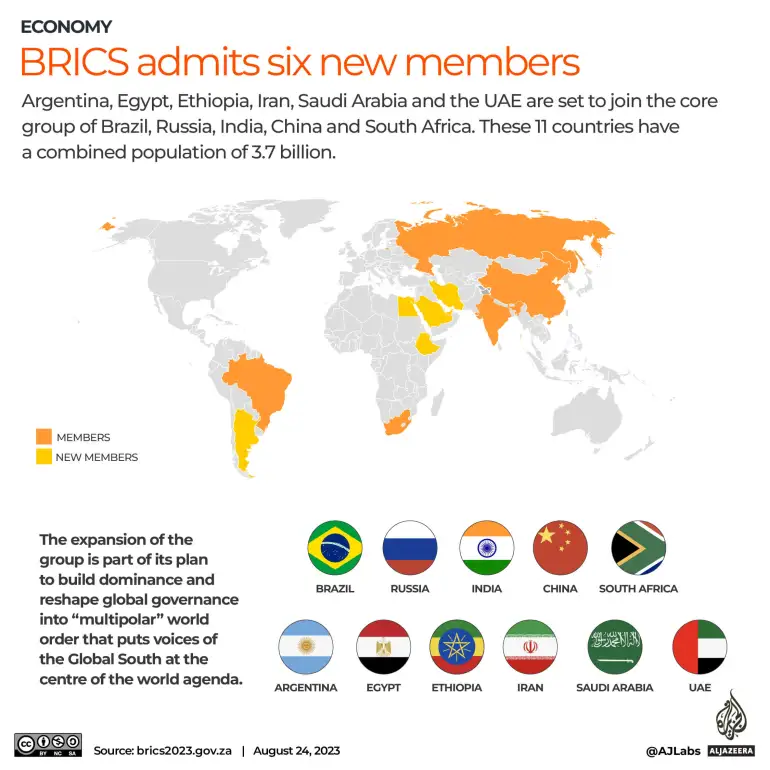
The chair’s report, which essentially captures the core of the atmosphere in the room, emphasizes the mounting calls for an end to the Gaza Strip war coming from the Global South.
The battle started on October 7, when the militant group Hamas attacked Israeli villages, killing 1,200 people and kidnapping 240 more. In retaliation, Israel has been shelling Gaza nonstop, hitting schools, hospitals, and refugee camps. This has killed over 13,000 people, many of them children, and violated international law.
Millions of people have since marched for a “Free Palestine” and demanded a ceasefire throughout Africa, Asia, and the Middle East. Scholars from Africa and other regions have charged the US, UK, and EU with being hypocritical for purporting to
Some nations were more aggressive in their presentations, but the chair’s summary seemed “mild and somewhat balanced,” according to Steven Gruzd, an analyst at the South African Institute of International Affairs (SAIIA).
President Ramaphosa of South Africa, who is now leading the BRICS, said in his opening remarks that Israel’s actions “are in plain violation of international law” and that the “collective punishment of Palestinian people by Israel “is a war crime… akin to genocide.” In addition, Ramaphosa declared that Hamas “must be held accountable” for violating international law.
India took a somewhat more moderate stand, with Foreign Minister Subrahmanyam Jaishankar stating that “peaceful resolution through dialogue and diplomacy” as well as “a need for restraint and immediate humanitarian support” were both necessary.
BRICS “Growing Assertiveness”
Some nations were more aggressive in their presentations, but the chair’s summary seemed “mild and somewhat balanced,” according to Steven Gruzd, an analyst at the South African Institute of International Affairs (SAIIA).
President Ramaphosa of South Africa, who is now leading the BRICS, said in his opening remarks that Israel’s actions “are in plain violation of international law” and that the “collective punishment of Palestinian people by Israel “is a war crime… akin to genocide.”
In addition, Ramaphosa declared that Hamas “must be held accountable” for violating international law.
India took a somewhat more moderate stand, with Foreign Minister Subrahmanyam Jaishankar stating that “peaceful resolution through dialogue and diplomacy” as well as “a need for restraint and immediate humanitarian support” were both necessary.
“I am not sure I recall a similar extraordinary summit being called. It does reflect on the growing assertiveness and confidence of the BRICS grouping, not waiting for the West. BRICS has generally shied away from political and security issues; this meeting goes against that trend.”
Steven Gruzd, analyst at the South African Institute of International Affairs (SAIIA).
The BRICS nations collectively account for 25% of the world’s economy and 40% of the world’s population.
Israel’s fiercest adversary, Iranian President Ebrahim Raisi, suggested that the Palestinians should hold a referendum to decide their future.
However, not just India but a number of the BRICS countries have developed relationships with Israel that they will be hesitant to break.
Gruzd points out that although China has significant investments in Israel, India has even closer historical ties to the nation and benefits from joint military and technological ventures.
However, India might not be able to control how a new BRICS+ will respond to Israel given that a ferocious Iran is expected to join the group, according to Gruzd.
According to analysts, South Africa, the smallest of the BRICS nations and a nation that endured harsh apartheid for over 40 years, sees parallels in the Palestinian struggle and has continuously been among the most vocal proponents of a ceasefire.
It has also long been Israel’s main trading partner in Africa. That relationship seemed to have reached a turning point on Tuesday.
Voters in parliament decided to close the Israeli embassy in Pretoria, which marked a sea change in the situation.
On November 6, the nation’s diplomats were already brought back from Israel. In response to Pretoria’s growing hostility, Israel called Eliav Belotserkovsky, its ambassador to South Africa, back for “consultations” on Monday.
Last week, South Africa, Bangladesh, Bolivia, Comoros, and Djibouti sent a referral to the International Criminal Court (ICC) asking them to look into possible war crimes in Gaza.
Bibi Netanyahu Should Be Sent to The Hague for War Crimes
Khumbudzo Ntshavheni, the Minister in the Presidency of South Africa, increased the pressure on Monday by requesting an International Criminal Court warrant against Israeli Prime Minister Benjamin Netanyahu.
He further stated that it would be a “total failure” if the court chose not to look into the leader.
Because President Vladimir Putin has an ICC arrest warrant out for war crimes committed in Ukraine, South Africa was able to persuade Russia earlier this year not to send him to the BRICS Summit in August.
South Africa, a signatory to the ICC, would have been required to arrest Putin had he attended the summit there.
According to activist Muhammed Desai of Africa4Palestine, the BRICS position announced on Tuesday—which was spearheaded by South Africa—may encourage other nations to vocally oppose the war.
“South Africa is a significant economic and political powerhouse on the African continent as well as a country with one of the most embassies and high commissions in the world. Thus, its stance and position does have clout within the diplomatic arena.”
Muhammed Desai of Africa4Palestine
Others, however, contend that the coalition’s political clout is insufficient to truly influence Israel’s war strategy. Gruzd of SAIIA stated, “To be honest, I don’t think they have much leverage on Israel directly.” “It won’t have much of an impact on the West, other than amplifying the calls for a ceasefire,” I add.
Still, their power is increasing. Many countries want to lessen their reliance on the US-led Western financial system, which is one of the main reasons for the expansion of BRICS earlier this year. Dozens of countries have applied or expressed interest in joining.
As the group’s 2024 president, Russia is anticipated to advocate for the use of local currencies rather than the US dollar, which is currently the currency of choice, for international trade payments.
Some claim that in order for the voice of the Global South to be heard, that platform is essential. Africa4Palestine’s Desai stated, “BRICS offers another voice within the global world order, and that is necessary to counter the current Western hegemonic view.”
Russia’s Sacred Duty to Gaza
Russian President Vladimir Putin made this argument on Wednesday, saying that Moscow has a moral duty to provide humanitarian aid to the civilian population in Gaza.
He had expressed to other BRICS leaders the previous day how videos showing Palestinian children undergoing surgery without anesthesia had affected him.
“When you watch how children are being operated on with no anesthesia – this of course arouses very special feelings. This is a very important, humanitarian, noble mission. We need to help people suffering as a result of the ongoing events.”
President Putin, addressing the Russian cabinet
The head of Russia continued by saying that helping Palestinian civilians in Gaza “our sacred duty.”
The End of the USD Reserve Currency Era – Experts Predict a Paradigm Shift
The imposition of sanctions served as a wake-up call to the global community regarding the vulnerabilities associated with the dollar’s usage.
Continue reading The End of the USD Reserve Currency Era – Experts Predict a Paradigm ShiftWelcome to the BRICS 11
‘No mountains can stop the surging flow of a mighty river.’ With the addition of six new members that add geostrategic clout and geographic depth to the once sputtering BRICS, the multilateral institution is now gathering the momentum needed to reset international relations.
Continue reading Welcome to the BRICS 11BRICS Nations Just Want What is Theirs
Economic interests will likely help the expanded bloc iron out long-standing feuds within.
Continue reading BRICS Nations Just Want What is TheirsBRICS 11 Strategic Tour de Force: Death Knell for the Petrodollar Sends Shockwaves Through the Empire!
Chinese President Xi Jinping defined all the major decisions embedded in the 15th BRICS summit in South Africa as “historic”. That may be seen as an understatement.
Continue reading BRICS 11 Strategic Tour de Force: Death Knell for the Petrodollar Sends Shockwaves Through the Empire!Global South Gains Upper Hand: BRICS+ Exceeding the Financial Might of Western-led Groups
Lula disclosed that the expanded coalition from the Global South will considerably exceed the financial might of western-led groups by incorporating six new members.
Continue reading Global South Gains Upper Hand: BRICS+ Exceeding the Financial Might of Western-led GroupsNew Members Announced on Expanded BRICS+
South African President Cyril Ramaphosa announced that the BRICS leaders have made the decision to invite Argentina, Egypt, Iran, Ethiopia, the UAE, and Saudi Arabia to become full members of BRICS. This membership is set to commence from January 1, 2024.
Continue reading New Members Announced on Expanded BRICS+BRICS Summit 2023: World Leaders Unveil Bold Visions for Global Growth and Cooperation
Leaders from the BRICS countries, namely Brazil, Russia, India, China, and South Africa, delivered their speeches on the first day of the BRICS Summit 2023 in Johannesburg, South Africa. During this summit, the leaders discussed their vision for the future of the BRICS group and addressed important global issues.
Continue reading BRICS Summit 2023: World Leaders Unveil Bold Visions for Global Growth and CooperationBRICS Summit 2023: Explosive Talks on Ditching Dollar Dominance with New Global Currency!
The 15th annual BRICS summit commenced on August 22nd as official representatives from various nations gathered in Johannesburg, South Africa.
Continue reading BRICS Summit 2023: Explosive Talks on Ditching Dollar Dominance with New Global Currency!China’s Bold Move: BRICS Aims to Dethrone G7 at Upcoming Summit
China intends to advocate for the transformation of the BRICS alliance into a robust competitor against the G7 during its imminent summit in South Africa, as reported by the Financial Times on Sunday.
Continue reading China’s Bold Move: BRICS Aims to Dethrone G7 at Upcoming SummitBRICS Unleashes Game-Changing Plan for a Fair and Multipolar World Order
The foreign minister of Russia has asserted that the global community is weary of the tactics of coercion and pressure employed by Western elites.
Continue reading BRICS Unleashes Game-Changing Plan for a Fair and Multipolar World OrderIran Becomes the 9th Member of Shanghai Cooperation Organization
The addition of Iran as the ninth full member of the Shanghai Cooperation Organization (SCO), an influential security and trade alliance, has been welcomed by Russian President Vladimir Putin, Chinese President Xi Jinping, and Indian Prime Minister Narendra Modi.
Continue reading Iran Becomes the 9th Member of Shanghai Cooperation OrganizationDe-Dollarization Kicks into High Gear
The US dollar is essential to US global power projection. But in 2022, the dollar share of reserve currencies slid 10 times faster than the average in the past two decades.
Continue reading De-Dollarization Kicks into High GearMultipolarity is About a Fair Redistribution of Power, Which the West Refuses to Accept
An equitable world order is gaining momentum as tensions flare between the dominant and emerging world powers
Continue reading Multipolarity is About a Fair Redistribution of Power, Which the West Refuses to AcceptSaudi Arabia Makes its Eurasian Shift
Saudi Arabia’s recent reconciliations with Iran and Syria under Chinese-Russian guidance is perceived as a step toward reducing Riyadh’s dependence on the US, while also advancing Beijing and Moscow’s political and economic influence in West Asia.
Continue reading Saudi Arabia Makes its Eurasian ShiftRussia, India, China, Iran: the Quad that really matters
Southeast Asia is right at the center of international relations for a whole week viz a viz three consecutive summits: Association of South East Asian Nations (ASEAN) summit in Phnom Penh, the Group of Twenty (G20) summit in Bali, and the Asia-Pacific Economic Cooperation (APEC) summit in Bangkok.
Continue reading Russia, India, China, Iran: the Quad that really matters‘Peaceful modernization’: China’s offering to the Global South
Xi Jinping just offered the Global South a stark alternative to decades of western diktats, war, and economic duress. ‘Peaceful modernization’ will establish sovereignty, economy, and independence for the world’s struggling states.
Continue reading ‘Peaceful modernization’: China’s offering to the Global SouthSaudi Arabia Looks To Join BRICS Next Year
Saudi Arabia expressed interest in being part of the BRICS economic bloc as it pivots away from Washington. Conversations with the alternative counter-western alliance representative, South African President Cyril Ramaphosa, started the ball rolling.
Continue reading Saudi Arabia Looks To Join BRICS Next Year‘Samarkand Spirit’ to Be Driven by ‘Responsible Powers’ Russia and China
Amidst serious tremors in the world of geopolitics, it is so fitting that this year’s Shanghai Cooperation Organization (SCO) heads of state summit should have taken place in Samarkand – the ultimate Silk Road crossroads for 2,500 years.
Continue reading ‘Samarkand Spirit’ to Be Driven by ‘Responsible Powers’ Russia and ChinaSCO Expansion to Give Region Greater Security, Stability
Member-countries welcomed the signing of memorandums of understanding with the League of Arab States, UNESCO, the Economic and Social Commission for Asia and the Pacific.
Continue reading SCO Expansion to Give Region Greater Security, StabilityIn Eurasia, the War of Economic Corridors is in Full Swing
Mega Eurasian organizations and their respective projects are now converging at record speed, with one global pole way ahead of the other.
The War of Economic Corridors is now proceeding full speed ahead, with the game-changing first cargo flow of goods from Russia to India via the International North South Transportation Corridor (INSTC) already in effect.
Very few, both in the east and west, are aware of how this actually has long been in the making: the Russia-Iran-India agreement for implementing a shorter and cheaper Eurasian trade route via the Caspian Sea (compared to the Suez Canal), was first signed in 2000, in the pre-9/11 era.
The INSTC in full operational mode signals a powerful hallmark of Eurasian integration – alongside the Belt and Road Initiative (BRI), the Shanghai Cooperation Organization (SCO), the Eurasian Economic Union (EAEU), and last but not least, what I described as “Pipelineistan” two decades ago.
Caspian is key
Let’s have a first look on how these vectors are interacting.
The genesis of the current acceleration lies in Russian President Vladimir Putin’s recent visit to Ashgabat, Turkmenistan’s capital, for the 6th Caspian Summit. This event not only brought the evolving Russia-Iran strategic partnership to a deeper level, but crucially, all five Caspian Sea littoral states agreed that no NATO warships or bases will be allowed on site.
That essentially configures the Caspian as a virtual Russian lake, and in a minor sense, Iranian – without compromising the interests of the three “stans,” Azerbaijan, Kazakhstan and Turkmenistan. For all practical purposes, Moscow has tightened its grip on Central Asia a notch.
As the Caspian Sea is connected to the Black Sea by canals off the Volga built by the former USSR, Moscow can always count on a reserve navy of small vessels – invariably equipped with powerful missiles – that may be transferred to the Black Sea in no time if necessary.
Stronger trade and financial links with Iran now proceed in tandem with binding the three “stans” to the Russian matrix. Gas-rich republic Turkmenistan for its part has been historically idiosyncratic – apart from committing most of its exports to China.
Under an arguably more pragmatic young new leader, President Serdar Berdimuhamedow, Ashgabat may eventually opt to become a member of the SCO and/or the EAEU.
Caspian littoral state Azerbaijan on the other hand presents a complex case: an oil and gas producer eyed by the European Union (EU) to become an alternative energy supplier to Russia – although this is not happening anytime soon.
The West Asia connection
Iran’s foreign policy under President Ebrahim Raisi is clearly on a Eurasian and Global South trajectory. Tehran will be formally incorporated into the SCO as a full member in the upcoming summit in Samarkand in September, while its formal application to join the BRICS has been filed.
Purnima Anand, head of the BRICS International Forum, has stated that Turkey, Saudi Arabia and Egypt are also very much keen on joining BRICS. Should that happen, by 2024 we could be on our way to a powerful West Asia, North Africa hub firmly installed inside one of the key institutions of the multipolar world.
As Putin heads to Tehran next week for trilateral Russia, Iran, Turkey talks, ostensibly about Syria, Turkish President Recep Tayyip Erdogan is bound to bring up the subject of BRICS.
Tehran is operating on two parallel vectors. In the event the Joint Comprehensive Plan of Action (JCPOA) is revived – a quite dim possibility as it stands, considering the latest shenanigans in Vienna and Doha – that would represent a tactical victory. Yet moving towards Eurasia is on a whole new strategic level.
In the INSTC framework, Iran will make maximum good use of the geostrategically crucial port of Bandar Abbas – straddling the Persian Gulf and the Gulf of Oman, at the crossroads of Asia, Africa and the Indian subcontinent.
Yet as much as it may be portrayed as a major diplomatic victory, it’s clear that Tehran will not be able to make full use of BRICS membership if western – especially US – sanctions are not totally lifted.
Pipelines and the “stans”
A compelling argument can be made that Russia and China might eventually fill the western technology void in the Iranian development process. But there’s a lot more that platforms such as the INSTC, the EAEU and even BRICS can accomplish.
Across “Pipelineistan,” the War of Economic Corridors gets even more complex. Western propaganda simply cannot admit that Azerbaijan, Algeria, Libya, Russia’s allies at OPEC, and even Kazakhstan are not exactly keen on increasing their oil production to help Europe.
Kazakhstan is a tricky case: it is the largest oil producer in Central Asia and set to be a major natural gas supplier, right after Russia and Turkmenistan. More than 250 oil and gas fields are operated in Kazakhstan by 104 companies, including western energy giants such as Chevron, Total, ExxonMobil and Royal Dutch Shell.
While exports of oil, natural gas and petroleum products comprise 57 percent of Kazakhstan’s exports, natural gas is responsible for 85 percent of Turkmenistan’s budget (with 80 percent of exports committed to China). Interestingly, Galkynysh is the second largest gas field on the planet.
Compared to the other “stans,” Azerbaijan is a relatively minor producer (despite oil accounting for 86 percent of its total exports) and basically a transit nation. Baku’s super-wealth aspirations center on the Southern Gas Corridor, which includes no less than three pipelines: Baku-Tblisi-Erzurum (BTE); the Turkish-driven Trans-Anatolian Natural Gas Pipeline (TANAP); and the Trans-Adriatic (TAP).
The problem with this acronym festival – BTE, TANAP, TAP – is that they all need massive foreign investment to increase capacity, which the EU sorely lacks because every single euro is committed by unelected Brussels Eurocrats to “support” the black hole that is Ukraine. The same financial woes apply to a possible Trans-Caspian Pipeline which would further link to both TANAP and TAP.
In the War of Economic Corridors – the “Pipelineistan” chapter – a crucial aspect is that most Kazakh oil exports to the EU go through Russia, via the Caspian Pipeline Consortium (CPC). As an alternative, the Europeans are mulling on a still fuzzy Trans-Caspian International Transport Route, also known as the Middle Corridor (Kazakhstan-Turkmenistan-Azerbaijan-Georgia-Turkey). They actively discussed it in Brussels last month.
The bottom line is that Russia remains in full control of the Eurasia pipeline chessboard (and we’re not even talking about the Gazprom-operated pipelines Power of Siberia 1 and 2 leading to China).
Gazprom executives know all too well that a fast increase of energy exports to the EU is out of the question. They also factor the Tehran Convention – that helps prevent and control pollution and maintain the environmental integrity of the Caspian Sea, signed by all five littoral members.
Breaking BRI in Russia
China, for its part, is confident that one of its prime strategic nightmares may eventually disappear. The notorious “escape from Malacca” is bound to materialize, in cooperation with Russia, via the Northern Sea Route, which will shorten the trade and connectivity corridor from East Asia to Northern Europe from 11,200 nautical miles to only 6,500 nautical miles. Call it the polar twin of the INSTC.
This also explains why Russia has been busy building a vast array of state-of-the-art icebreakers.
So here we have an interconnection of New Silk Roads (the INSTC proceeds in parallel with BRI and the EAEU), Pipelineistan, and the Northern Sea Route on the way to turn western trade domination completely upside down.
Of course, the Chinese have had it planned for quite a while. The first White Paper on China’s Arctic policy, in January 2018, already showed how Beijing is aiming, “jointly with other states” (that means Russia), to implement sea trade routes in the Arctic within the framework of the Polar Silk Road.
And like clockwork, Putin subsequently confirmed that the Northern Sea Route should interact and complement the Chinese Maritime Silk Road.
Russia-China Economic cooperation is evolving on so many complex, convergent levels that just to keep track of it all is a dizzying experience.
A more detailed analysis will reveal some of the finer points, for instance how BRI and SCO interact, and how BRI projects will have to adapt to the heady consequences of Moscow’s Operation Z in Ukraine, with more emphasis being placed on developing Central and West Asian corridors.
It’s always crucial to consider that one of Washington’s key strategic objectives in the relentless hybrid war against Russia was always to break BRI corridors that crisscross Russian territory.
As it stands, it’s important to realize that dozens of BRI projects in industry and investment and cross-border inter-regional cooperation will end up consolidating the Russian concept of the Greater Eurasia Partnership – which essentially revolves around establishing multilateral cooperation with a vast range of nations belonging to organizations such as the EAEU, the SCO, BRICS and ASEAN.
Welcome to the new Eurasian mantra: Make Economic Corridors, Not War.
United Eurasia: Russia is Betting the Days of Total U.S. Economic Supremacy are Ending
The centre of the world is moving. While once it sat somewhere within the Atlantic, balanced between Europe and the US, it is now moving east. With Asia on the rise, Russia is now planning its role at the heart of two continents.
Continue reading United Eurasia: Russia is Betting the Days of Total U.S. Economic Supremacy are EndingRussia, China Need to Move Away from Dollar to Reduce Risks of U.S. Sanctions
Russia and China need to work to further reduce their dependence on the dollar and switch to national currencies for trade in order to alleviate the risks of US sanctions, says Russia’s top diplomat.
Continue reading Russia, China Need to Move Away from Dollar to Reduce Risks of U.S. SanctionsChina & India are not Going to War Against Each Other Anytime Soon
Both members of the BRICS Alliance are not going to escalate the tension in the disputed Himalayan border anytime soon. Divide and conquer special operation has been defeated.
Continue reading China & India are not Going to War Against Each Other Anytime SoonEnergy Research Takes Priority Under Russia’s BRICS Chairmanship
After the Ufa declaration in 2015, BRICS, an association of five major emerging economies that includes Brazil, Russia, India, China and South Africa, has made energy cooperation one of its priorities besides attaining an admirable significant influence on regional affairs and very active on the global stage.
Continue reading Energy Research Takes Priority Under Russia’s BRICS ChairmanshipThe RCEP Train has Left the Station, Inspite of India
The Regional Comprehensive Economic Partnership is a proposed free trade agreement between the ten member states of the Association of Southeast Asian Nations and its five FTA partners. In November 2019, India, the sixth FTA partner, decided to opt out of the pact due to domestic concerns against potential Chinese flooding of its agriculture sector.
Continue reading The RCEP Train has Left the Station, Inspite of IndiaThe Rise of Multipolarity through Greater Eurasia
The center of geopolitical and geoeconomic gravity is shifting systematically towards Eurasia through the leadership of Russia and China, and the cooperation of most countries in the continent, through the principle of multipolarity.
Continue reading The Rise of Multipolarity through Greater EurasiaRailway Partnership Agreement between Russia and India is Under Way
As is well known, Russian technologies are in high demand throughout the world, thanks to their high quality and relatively low cost. This applies both to technologies used in the space, defense and energy sectors, and to those used in everyday life, for example in the railway transport sector. Continue reading Railway Partnership Agreement between Russia and India is Under Way
Russian and Allied War Games Intensify vs. US-NATO Military Buildup on its Borders
Barely reported by the Western media, Russia has launched a series of war games in Europe and the Far East together with several of its allies. These war games are largely in response to NATO’s military buildup on Russia’s Western frontier, in Eastern Europe, The Baltic States and Scandinavia. Continue reading Russian and Allied War Games Intensify vs. US-NATO Military Buildup on its Borders
Global Alliance Moving for A Checkmate vs the Deep State
Recent events have become too obvious to ignore in the context of the ongoing covert war between the Alliance and the Deep State. Right after what we believe as an electromagnetic attack on Ukrainian arms and ammunition depot, Crimea plunged into a day of terror when “face masked terrorists” stormed a public school in Crimea, which even Putin later on acknowledged as an individual unable to adjust to “globalization” – a generic term which may apply to economic, geopolitics and terror. Continue reading Global Alliance Moving for A Checkmate vs the Deep State
Bonus for the “Big Eight” in Qingdao, SCO Summit | Mikhail Konarovsky
The G7 summit in Quebec (Canada) and the SCO summit in Qingdao (China) took place at almost exactly the same time and once again clearly demonstrated the ever growing multipolarity of global and trans-regional development. However, while the Group of Seven meeting took a step backwards of sorts — or, put simply, actually failed — the SCO summit took a step forward towards its expansion and the further development of cooperation between the member states. Continue reading Bonus for the “Big Eight” in Qingdao, SCO Summit | Mikhail Konarovsky
Russia-China Real Gold Standard Means End of US Dollar Dominance
The BRICS counties are considering starting an internal gold trading platform, according to Russian officials. When this happens, the global economy will be significantly reshaped, and the West will lose its dominance, predicts a precious metals expert. Continue reading Russia-China Real Gold Standard Means End of US Dollar Dominance
Iran & China Seek to Eliminate US dollar from Bilateral Trade
Dollar dumping used to be mere rumor 5 years ago, but Tehran, Russia and Beijing are determined to find ways to avoid using the US dollar as a settlement currency in trade, according to a report by Iranian economic daily Financial Tribune. Continue reading Iran & China Seek to Eliminate US dollar from Bilateral Trade
BRICS Consider Setting Up Gold Trading System
The highly anticipated global reset is about to be formally introduced. This includes the shift of at least 60% of the global economy to the gold standard and other asset-based currencies. This is the first time that they’ve announced their intention as a group. Continue reading BRICS Consider Setting Up Gold Trading System
A Grand Strategy for Peace
The ongoing development in the Eurasian land mass known as the One Belt One Road is patterned after Lyndon LaRouche and his wife’s concept of a Eurasian Land Bridge that will spur development for all countries being traversed by modern railway networks. This to them is the formula by which peace could be fostered through unity in commerce and peaceful exchanges of culture. Continue reading A Grand Strategy for Peace
Putin Calls Out US Folly
On one of the rarest of occasions, the Russian president vented his frustration in dealing with the American government, during the last BRICS Summit in Xiamen, China. Continue reading Putin Calls Out US Folly
The BRICS Strike Back
The wide-ranging Xiamen Declaration, issued in conjunction with the just wrapped-up annual BRICS summit, shows that Brazil, Russia, India, China and South Africa, although facing internal challenges of their own, may be about to step up their collective game, big time.
And they won’t be intimidated/derailed by the crumbling unipolar order.
Continue reading The BRICS Strike Back
Let's Get Ties On 'Right Track', China's Xi Jinping Tells PM Narendra Modi
In the last two weeks, both India and China are at loggerheads when the former decided to encroach into the Chinese side of the border in the Doklam. The incursion is related to the OBOR CPEC projects in Pakistan, which has been India’s geopolitical enemy since the death of Mahatma Gandhi – a legacy of UK’s highly effective divide and conquer strategy in the region, which saw the deaths of millions from both sides. Continue reading Let's Get Ties On 'Right Track', China's Xi Jinping Tells PM Narendra Modi
North & Korean delegations Arrive in Russia, as Putin Mediates for Tension Deescalation
The Eastern Economic Forum is a unique meeting which will be attended by delegations from Russia, China, Japan, Vietnam, Mongolia, South Korea and North Korea. Continue reading North & Korean delegations Arrive in Russia, as Putin Mediates for Tension Deescalation
BRICS Financial Institutions to Support African, Latin American Development
Development projects in Africa and Latin America will henceforth receive greater attention from the Brazil, Russia, India, China and South Africa, BRICS bloc financial institutions such as the New Development Bank, NDB and the Asian Infrastructure Investment Bank, AIIB. Continue reading BRICS Financial Institutions to Support African, Latin American Development
Has Narenda Modi Switched Sides?
It’s very discomforting to see the nation of India, one of the great potential leading countries of the world systematically self-destruct. Continue reading Has Narenda Modi Switched Sides?
Russia-China Tandem Shifts Global Power | Ray McGovern
Official Washington’s arrogance in trying to push around Russia and China has pushed the two countries together, creating a dangerous new dynamic in international relations, explains ex-CIA analyst Ray McGovern. Continue reading Russia-China Tandem Shifts Global Power | Ray McGovern
Leading the World by Example by Building Cities of the Future
China is offering the world a better way to move forward. It is not perfect, and has nothing to do with exotic technologies yet, at least not for now. But it is far better than what the West is trying to do, even to its own population. It has achieved so much in a relatively short time, i.e. has caused the upliftment of at least 800 million for the last 3 decades. Continue reading Leading the World by Example by Building Cities of the Future
China Proposes "Blue Economic Passages" For Global Maritime Cooperation
China continues to take the high road, and is making known worldwide what her desires are, i.e. instead of feeding the appetite of others to the unending of conflicts in carefully established hotspots on the planet, China wants to forge a “blue partnership” of mutual benefit among countries along the planned “21st Century Maritime Silk Road”, Continue reading China Proposes "Blue Economic Passages" For Global Maritime Cooperation
























